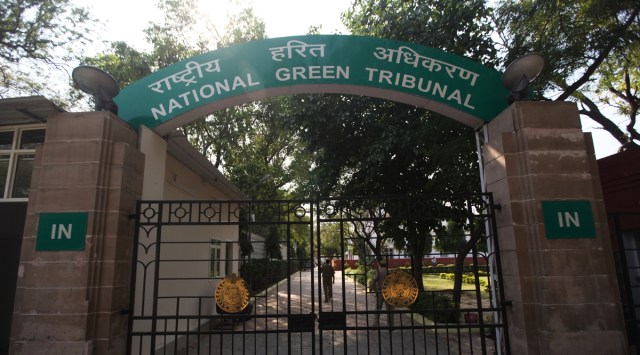- India
- International
NGT imposes Rs 3,825 crore penalty on Telangana for poor urban waste management
The tribunal's principal bench in New Delhi, after hearing the issue on Sept 29, suggested that Telangana raise funds by imposing user charges on households and businesses for discharging the waste.
 The NGT said the failure of the state has resulted in rivers like Musi in Hyderabad becoming a channel to carry sewage which needs to be remedied. (Express)
The NGT said the failure of the state has resulted in rivers like Musi in Hyderabad becoming a channel to carry sewage which needs to be remedied. (Express)The National Green Tribunal (NGT) has imposed a penalty of Rs 3,825 crore as environmental compensation on Telangana for continued failure to treat municipal solid and liquid waste in Hyderabad and other urban local bodies in the state.
The tribunal’s principal bench in New Delhi, after hearing the issue on September 29 as directed by the Supreme Court, suggested that the state raise funds by imposing user charges on households and business establishments for discharging waste.
Noting that the statutory timelines for remediation of legacy waste expired on April 7, 2021, the NGT’s principal bench said the liability of the state for past violations has to be quantified on the principle of ‘polluter pays’ and has to be utilised for restoration of the environment.
“Suitable mechanism be laid down in two months such as user charges by households/contribution of corporate, business sectors, commercial establishments who contribute to waste. Further steps have to be taken in a mission mode to comply with MSW (municipal solid waste) rules without further delay,” it said.
The bench observed that there has been no substantial progress since February 2020, when the chief secretary last appeared before the tribunal, as there still exist huge gaps in the management of solid and liquid waste. From the data submitted by the state, the bench pointed out a gap of 1,824.42 million litres per day (MLD) in generation and treatment of liquid waste and sewage, and 2,446 tonnes per day (TPD) in solid waste management.

This also includes un-remediated legacy waste of 5.9 million tonnes of solid waste in 141 urban local bodies (ULB). “These dump sites in operation as well as the legacy waste dump sites remain sources of air, water and land pollution resulting in damage to environment and public health,” it was observed.
It said the failure of the state has resulted in rivers like Musi in Hyderabad becoming a channel to carry sewage which needs to be remedied. The sewage should be separately managed without mixing it in stormwater drains, rivers or water bodies. Regarding bridging the gap in addressing municipal solid waste, the bench suggested expeditious operationalisation of a cluster approach proposed for 129 ULBs to process 2,974 TPD of waste while keeping environmental safety in mind.
It also called for efforts for the utilisation of treated sewage such as by establishments like malls, industrial estates, automobile establishments, power plants, playgrounds, railways, bus stands, local bodies, universities etc to save potable water for drinking.
“Apart from compliance in future, the liability of the state has to be fixed for the past violations… Compensation has to be equal to the loss to the environment and also taking into account cost of remediation,” the bench remarked in its conclusions, while determining the total compensation payable by the Telangana government to Rs 3,825 crore. This includes Rs 3,648 crore for its failure to treat liquid waste or sewage and Rs 177 crore for failure to scientifically manage solid waste.
According to the order, “The total compensation may be deposited by the state of Telangana in a separate ring-fenced account within two months, to be operated as per directions of the chief secretary and utilised for restoration measures. It will be open to the state to plan raising funds from generators/contributors to waste.” The tribunal fixed the responsibility of compliance with the chief secretary for which a special senior level nodal secretary with a team of technical experts may be deputed immediately. It also called for six-monthly progress reports from the chief secretary.
Buzzing Now
Apr 20: Latest News
- 01
- 02
- 03
- 04
- 05







































